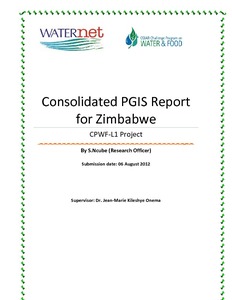Resource information
In Zimbabwe, the Participatory Geographic Information Systems (PGIS) data collection exercise for the Challenge Program on Water and Food (CPWF?L1) was done in three districts that fall within the confines of the Limpopo River Basin. These districts are Insiza, Matobo and Gwanda which are all found in Zimbabwe’s Matabeleland South province. In all the districts data collection was done at two levels, in which the first level entailed conducting interviews and focused group discussions with the district stakeholders. The second level of data collection entailed conducting focused group discussions with the selected communities. Three PGIS team members facilitated the data collection exercise with the support from the provincial Agritex office.
The main objective of the PGIS data collection exercise was to identify successful cases on Agricultural Water Management technologies that have been implemented in these districts and hence develop a clear understanding of what made these technologies successful from a variety of viewpoints. The identified technologies were described in terms of adoption, adaptation and contribution to livelihoods among the rural communities.
Key stakeholders were invited to attend the data collection exercise at the district level. These included District Administrators, Rural District Councils, AGRITEX, NGOs and other government line ministries operational in these districts. At the community level, a specified number of farmers involved in the identified projects were invited to attend the focus group discussions. This report gives a consolidated outline of the intervention technologies that were identified in these three districts and further gives a reflection on some of the lessons learnt during field work which could be of benefit for similar data collection work in the other countries within the Limpopo River Basin. Briefly the main intervention technologies identified were: conservation agriculture in Insiza district, sand water abstraction in Matobo district and fodder production in Gwanda district.


